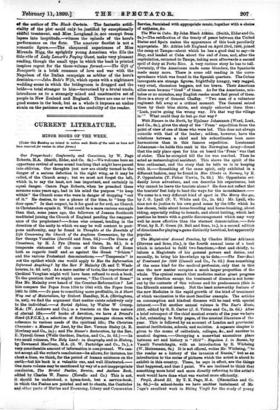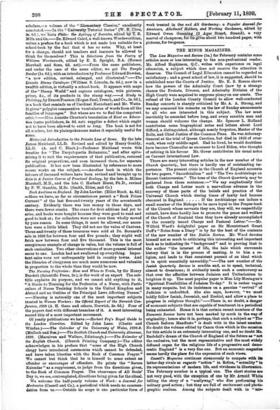Virgil, £neid XI. By T. E. Page, M.A. (Macmillan and
Co. ls. 6d.)—In school-books we have another instalment of Mr. 1-'age's excellent work in fitting Virgil for the study of young
scholars,— a volume of the " Elementary Classics," excellently annotated.—In the "University Tutorial Series" (W. B. Clive,
3s. Gd.), we have Plato : the Apology of Socrates, edited by T. R.
Mills and Co.—Dr. Edward Caird, a well-known Wordsworthian, writes a preface for a book which is not made less suitable for a
school-book by the fact that it has no notes. Why, at least for a change, should not teachers and learners be allowed to think for themselves ? This is Selections from the Poetry of Wittiam Wordsworth, edited by E. E. Speight, B.A. (Horace Marshall and Sons, 6d. net).—From the same publishers, and under the care of the same editor, we get The Temple
Reader (Is. 6d.), with an introduction by Professor Edward Dowden,
"a new edition, revised, enlarged, and illustrated."—The Lincoln Stamp Cata/ogu- (William S. Lincoln, 3s. 6c1.), now in a
twelfth edition, is virtually a school-book. It appears with maps
of the "Stamp World" and copious catalogues, with pictures, prices, &c., of its products in the stamp way.—A Study in Philology, by Ernest Pearson (Kegan Paul, Trench, and Co., 3s. Gd.),
is a book that reminds us of Cardinal Mezzofanti and Mr. Watts. It gives" polyglot comparative vocabularies of words from all the families of languages." But where are we to find the competent
critic ?—Miss Annette Churton's translation of Kant CM Educa- tion (same publishers, 2s. 6d. net► supplies a defect which ought
not to have been allowed to exist so long. The book is not for all readers, but its plainspokenness makes it especially useful for game.







































 Previous page
Previous page